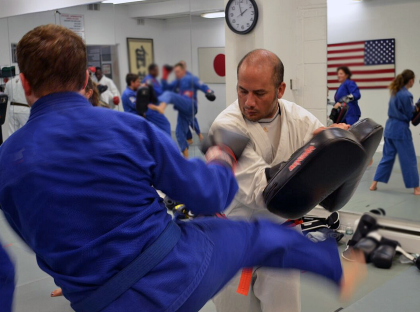In ’94, when I was competing for a spot on the Pan-American Olympic karate team, I was going against the heavyweight national champion from the rival organization. During a heated match, he fell and broke his neck and is to this day paralyzed for life.
That event totally spun me around. It was what Stephen Covey calls a “paradigm shift” – a moment when all the values and ratios of your life seem to invert, and you get a unique glimpse into who you are and how you have been living.
 During the time of this incident, I was spending most of my time with very aggressive, full-contact fighters. I didn’t spend a lot of time considering other people’s humanity. And one of the things I’m most ashamed about in my life is that when that event happened, my knee-jerk response was, “Fuck that guy – he tried to hurt me. He got what he deserved.”
During the time of this incident, I was spending most of my time with very aggressive, full-contact fighters. I didn’t spend a lot of time considering other people’s humanity. And one of the things I’m most ashamed about in my life is that when that event happened, my knee-jerk response was, “Fuck that guy – he tried to hurt me. He got what he deserved.”
And after a little bit of time went by and I tried to make sense of what had happened (along with my reaction to it) I realized, “Wow. That’s me. Those feelings and that attitude is what I am. That’s who I have become in the world.”
So I started to really question what got me to that point. What were all of the influences and all the different circumstances that led to a place where my sense of humanity had disappeared? I went into the edges of my own experiences and found that I was faced with a bigger question: “What the hell am I going to do about this? How will I continue to live my life? Is this my final incarnation – is this who I’m going to turn out to be?”
Over time, I started to look at the structure of competition, the nature of win-lose, the results of a culture where violence is accepted and encouraged. If I was to be optimistic, I’d say that these concepts don’t get examined enough; if I were a pessimist, I’d note that they’re glorified in MMA, organized sports and are a big part of popular martial arts culture.
It brings us to a question we often ask on the mat, and actually our martial culture is built around this question: “What are you *doing* with your day?” Behind it is an imperative to get something from the day, to seize the moment, and to do with it something worthwhile. That’s an important question.
But I think another equally important question – maybe even more important – is “what are you *getting* from your day?”. In other words, what is life having us respond to, what’s it continually asking from us? Who is it requiring us to be?
In 1994, I had to respond to that. I had to do something about the experience in that tournament, otherwise I think I was dead in the water. The rest of my life would be the life of a zombie – alive but dead.
So the hope is that this leads to a big question mark for you also. It doesn’t only need to happen with a heavy experience like the example I gave. Who are you becoming in the world? What’s life calling you to do? Answering these type of questions is a lifetime of work, and the martial arts is the best tool you could have to do it.
For more about the larger project of cooperative Jiu-Jitsu and martial arts training, visit the Brooklyn Brazilian Jiu-Jitsu (Brooklyn BJJ) website here.